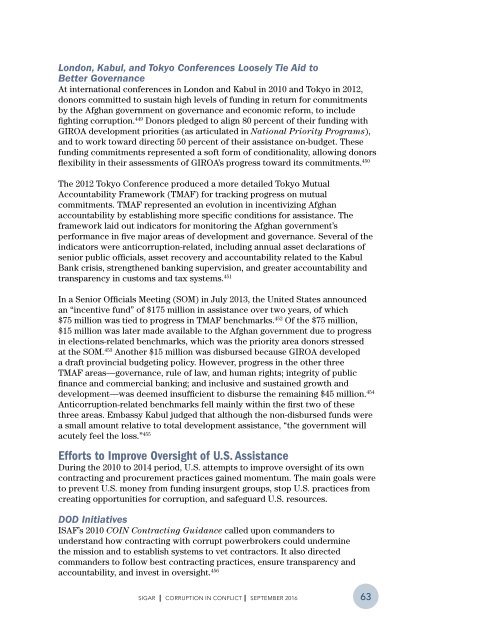CORRUPTION IN CONFLICT
5IlaWjQej
5IlaWjQej
You also want an ePaper? Increase the reach of your titles
YUMPU automatically turns print PDFs into web optimized ePapers that Google loves.
London, Kabul, and Tokyo Conferences Loosely Tie Aid to<br />
Better Governance<br />
At international conferences in London and Kabul in 2010 and Tokyo in 2012,<br />
donors committed to sustain high levels of funding in return for commitments<br />
by the Afghan government on governance and economic reform, to include<br />
fighting corruption. 449 Donors pledged to align 80 percent of their funding with<br />
GIROA development priorities (as articulated in National Priority Programs),<br />
and to work toward directing 50 percent of their assistance on-budget. These<br />
funding commitments represented a soft form of conditionality, allowing donors<br />
flexibility in their assessments of GIROA’s progress toward its commitments. 450<br />
The 2012 Tokyo Conference produced a more detailed Tokyo Mutual<br />
Accountability Framework (TMAF) for tracking progress on mutual<br />
commitments. TMAF represented an evolution in incentivizing Afghan<br />
accountability by establishing more specific conditions for assistance. The<br />
framework laid out indicators for monitoring the Afghan government’s<br />
performance in five major areas of development and governance. Several of the<br />
indicators were anticorruption-related, including annual asset declarations of<br />
senior public officials, asset recovery and accountability related to the Kabul<br />
Bank crisis, strengthened banking supervision, and greater accountability and<br />
transparency in customs and tax systems. 451<br />
In a Senior Officials Meeting (SOM) in July 2013, the United States announced<br />
an “incentive fund” of $175 million in assistance over two years, of which<br />
$75 million was tied to progress in TMAF benchmarks. 452 Of the $75 million,<br />
$15 million was later made available to the Afghan government due to progress<br />
in elections-related benchmarks, which was the priority area donors stressed<br />
at the SOM. 453 Another $15 million was disbursed because GIROA developed<br />
a draft provincial budgeting policy. However, progress in the other three<br />
TMAF areas—governance, rule of law, and human rights; integrity of public<br />
finance and commercial banking; and inclusive and sustained growth and<br />
development—was deemed insufficient to disburse the remaining $45 million. 454<br />
Anticorruption‐related benchmarks fell mainly within the first two of these<br />
three areas. Embassy Kabul judged that although the non-disbursed funds were<br />
a small amount relative to total development assistance, “the government will<br />
acutely feel the loss.” 455<br />
Efforts to Improve Oversight of U.S. Assistance<br />
During the 2010 to 2014 period, U.S. attempts to improve oversight of its own<br />
contracting and procurement practices gained momentum. The main goals were<br />
to prevent U.S. money from funding insurgent groups, stop U.S. practices from<br />
creating opportunities for corruption, and safeguard U.S. resources.<br />
DOD Initiatives<br />
ISAF’s 2010 CO<strong>IN</strong> Contracting Guidance called upon commanders to<br />
understand how contracting with corrupt powerbrokers could undermine<br />
the mission and to establish systems to vet contractors. It also directed<br />
commanders to follow best contracting practices, ensure transparency and<br />
accountability, and invest in oversight. 456<br />
SIGAR I <strong>CORRUPTION</strong> <strong>IN</strong> <strong>CONFLICT</strong> I SEPTEMBER 2016<br />
63


